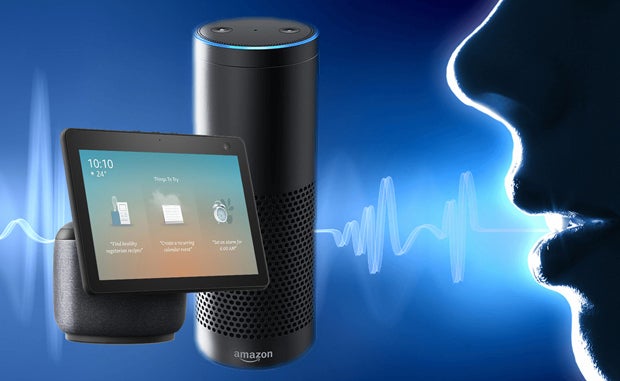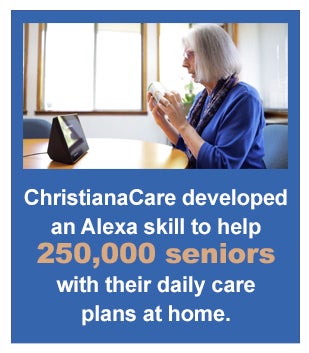

Alexa, What Is Your Future in Health Care?

Amazon has a huge desire to disrupt health care, and one of its most powerful weapons in this effort is an unassuming device that has gained unrivaled access to consumers.
The Echo smart speaker platform and Alexa artificial intelligence-powered virtual assistant now reside in more than 50 million U.S. homes and Amazon says it has about 70% of the voice-assistant market. With ever-increasing frequency, consumers are asking Alexa questions about their health and wellness as some hospitals and health systems race to build programs for the platform to engage with patients.
Amanda Goltz, who leads business development for Alexa Health and Wellness at Amazon, notes that millions of Americans now use Alexa to refill prescriptions, schedule doctor visits, access daily care plans set up by their physicians and more. But in a recent talk hosted by the Chicago-based innovation incubator Matter, Goltz said that health care voice technology applications are only scratching the surface of their potential.
Voice Applications in the Pandemic
During the pandemic, Amazon expanded health care voice applications, placing Echo devices with Alexa in about 200 hospitals, including COVID-19 isolation units to help staff and patients communicate with each other at a safe distance. The deployment was facilitated under emergency HIPAA guidance from the Department of Health & Human Services.
 Amazon is using what was learned from this and other health care experiences to advance its products and to learn more from clinicians about best-use cases for voice technology. While noting that Alexa won’t be used to diagnose or treat patients and that Amazon doesn’t plan to pursue FDA regulatory review for those purposes, Goltz says the voice assistant can help physicians with tasks like ordering, assisting staff and more.
Amazon is using what was learned from this and other health care experiences to advance its products and to learn more from clinicians about best-use cases for voice technology. While noting that Alexa won’t be used to diagnose or treat patients and that Amazon doesn’t plan to pursue FDA regulatory review for those purposes, Goltz says the voice assistant can help physicians with tasks like ordering, assisting staff and more.
Next month, Amazon plans to release results from a trial conducted with ChristianaCare on the Alexa skill it developed to help 250,000 seniors with their daily care plans at home. The integrated delivery network built a comprehensive home health skill on Alexa that enables seniors to ask their home health coaches what they’re supposed to do that day and receive instructions.
The skill changes dynamically each day based on information in the electronic health record about each patient’s care plan instructions, such as whether medications, dosing or timing have changed; physical therapy and occupational therapy exercises or visits; visits from home nurses or home care aides; wound care checks, etc.
Goltz encourages hospitals and health systems to explore ways to use voice technology to engage with patients at home. Free natural language understanding and machine learning tools are available through Amazon’s Alexa developer console. The site also provides story boards, tutorials and links to agencies that can help health care organizations build multiconversational terms to collect the data needed to deliver the experience they want for both patients and clinicians.
3 Keys to Developing a Voice Strategy
1. Begin with a great use case.
The best use case is something that is hands-free and can be done more easily by voice than an app or website. A New England children’s hospital developed a skill called My Daily Check-in to assist parents in caring for their children after surgery. Alexa can deliver the hospital’s post-surgical care instructions daily, including what to look for when examining the surgical site and more.
2. Offer a new service.
Voice and video (which can be displayed on Echo 10 versions) can communicate and show new services or connect patients with products and services to help them on their health care journey.
3. Change skills frequently.
Be prepared. Voice-assistant skills have to be updated far more often than apps or websites because Alexa and other voice assistants need to have fresh and new content. This can be something as simple as a health care tip of the day, such as a prompt to ask your doctor if you need to take a daily vitamin D supplement.



